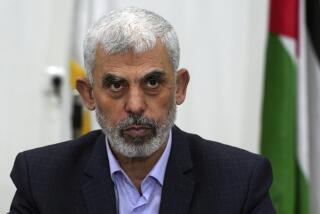Sharon Resigns at Stormy Meeting : Israel: Hawkish Cabinet minister debates Shamir in a heated give-and-take. Shamir walks out of party meeting.
- Share via
TEL AVIV — Israeli Prime Minister Yitzhak Shamir walked out of a chaotic meeting of his Likud Party on Monday after a verbal brawl with hawkish rival Ariel Sharon, who surprised everyone by quitting his Cabinet post to protest developing peace talks.
During the meeting, Shamir sought a vote of confidence in his leadership while Sharon tried to drum up votes to block compromises in peace negotiations.
Sharon demanded that the Palestinian uprising come to an end before talks begin and that the talks be barred to Palestinians expelled from Israel and Arab residents of East Jerusalem. Both men tried to have their way--at the same time--by shouting into microphones and calling for the party’s 3,000 Central Committee members to vote.
“You must confirm me in my work. That’s my resolution to the Central Committee,” the bantam-sized Shamir called out as he peered over the podium. Hands in the audience started going up.
“Who is in favor of wiping out terror? I ask the committee,” began the portly Sharon, leaning into his own mike.
The crowd, gathered in a Tel Aviv exhibition hall, roared. It was difficult to say just who was supporting whom, although Sharon supporters set off loud chants of “Arik! Arik!”--Sharon’s nickname.
“Please sit down,” Shamir told Sharon. “Democracy will decide who has faith in me, who has confidence.”
“Who is in favor of excluding deportees? Raise your hands,” commanded Sharon, who until Monday was minister of trade and industry.
“Ah, nonsense! Vote only on this resolution. . . !” yelled Shamir, thrusting a finger into the air.
“Who is in favor of excluding East Jerusalem Arabs?” Sharon asked loudly.
The crowd was on its feet, booing and cheering all at once. Each contestant declared himself the winner. Shamir adjourned the meeting and trudged off the dais, circled by grim-faced security agents and trailed by a flock of his Cabinet ministers. Sharon’s backers taunted the 74-year-old prime minister with hisses and calls of “Coward! Coward!”
Sharon slapped down his memo pad, stayed on the speakers’ platform and was joined by allies from the audience.
Did Shamir get a hands-up vote of confidence and end the meeting before Sharon’s attack? Were the shouts in answer to Sharon’s resolutions a defeat for the prime minister? It was like a bout the World Boxing Assn. might rule on.
By offering his resignation, the 61-year-old Sharon shed responsibility for Cabinet decisions and can now focus on undermining Shamir’s leadership in Likud, party observers said. Sharon himself hinted as much: “I decided to resign from the government to continue my struggle for reaching our national objectives, which are now endangered as a result of the government’s policy.”
Sharon, a former defense minister who led Israel into the 1982 Lebanon war, claimed that he told Shamir of his resignation by letter Sunday. Shamir said he knew nothing about it until the meeting got under way, and there was no indication that he had accepted it.
The meeting, called by Sharon and two other hawkish Cabinet ministers from the Likud Party, attracted wide attention because of its possible impact on efforts to arrange Israeli-Palestinian peace talks.
U.S. Secretary of State James A. Baker III has proposed a meeting with the foreign ministers of Israel and Egypt to work out a list of Palestinian participants. The chosen Palestinian panel and the Israelis would discuss Shamir’s plan to hold elections in the West Bank and Gaza Strip.
For the past seven months, the peace effort has stalled over which Palestinians will take part. Participation would either be limited to residents of the occupied West Bank and Gaza Strip or would also include East Jerusalemites as well as Palestinians who have been expelled by Israel.
Israel is wary that Palestinians-in-exile will front for the Palestine Liberation Organization, which is based in Tunisia. Many Israelis believe that if Jerusalem Arabs take part, the talks might throw into question the country’s hold on its own capital.
In his speech, which kicked off the meeting, Sharon expressed a lack of confidence in Shamir. “Under your government,” he said, turning toward the prime minister, “Palestinian terror runs wild within the land of Israel and causes heavy losses to innocent Jews and Arabs.” Sharon made a pitch for a tougher crackdown on the uprising, as well as for Israel to keep all the occupied land.
Israeli soldiers have killed 600 Palestinians during the intifada, or uprising. Another 160 Arabs died at the hands of Palestinians themselves, mainly on suspicion of collaborating with Israeli authorities. Forty Israelis have been killed by Palestinians in Israel and the disputed land.
Last week, two terrorists shot up and threw grenades into a tourist bus in Egypt and killed nine Israelis on board. Israeli officials say the killers were Palestinians expelled from Israel during the past five years.
In a head-to-head battle with Sharon, Shamir appears to have the upper hand. Political experts had predicted a 2-to-1 victory by Shamir had the issue actually come to a vote of confidence.
Foreign Minister Moshe Arens assured reporters that despite the dispute, the government will go on promoting a vote in the territories.
More to Read
Sign up for Essential California
The most important California stories and recommendations in your inbox every morning.
You may occasionally receive promotional content from the Los Angeles Times.













